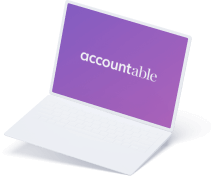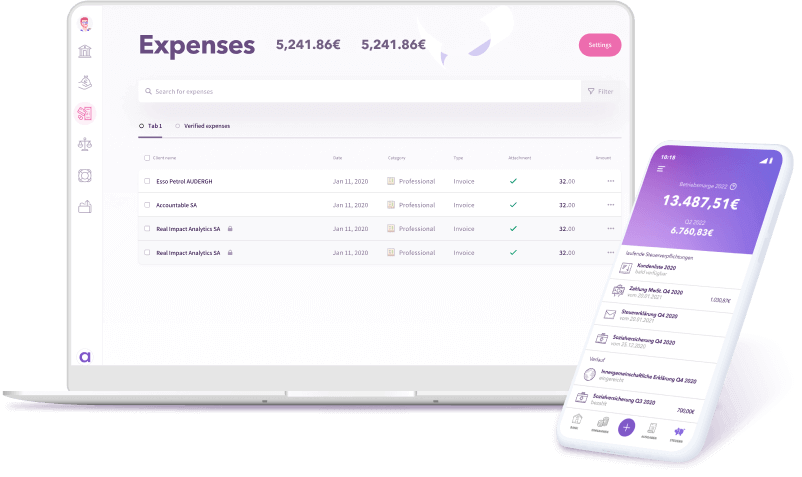
This is the difference between business expenses and income-related expenses
Read in 3 minutes
If you are self-employed, you have to pay income tax on your earnings. However, you can also deduct certain work-related expenses from your income – and thus reduce your tax liability.
However, the two terms “Betriebsausgabe” (business expense) and “Werbungskosten” (income-related expenses) are often wrongly used interchangeably. That’s why we’ll explain in this short guide exactly how these two terms differ and which of them is really relevant for self-employed people.
Income-related expenses: Deducting costs as an employee
If you work as an employee, your employer usually provides you with all the necessary work materials. This refers to a workplace, necessary work equipment such as a computer or even a uniform, as well as potential travel expenses for business trips.
Costs that are incurred in addition to these, but are not covered by the employer, can be claimed by employees in their tax return as so-called income-related expenses, or Werbungskosten in German.
Typical income-related expenses include, for example:
- Expenses for application documents
- Expenses for travel to job interviews
- Expenses for participation in trainings
💡Tip from Accountable: The limit for deducting income-related expenses currently sits at 1,250€. You can’t claim more than this amount for tax purposes as an employee.
Business expenses: Deducting costs as a self-employed person
As a self-employed person, you can also deduct work-related expenses from your taxes. However, in this case one does not speak of income-related expenses, but of business expenses, or Betriebsausgaben in German. Income-related expenses refer exclusively to income from a non-self-employed activity.
You can deduct business expenses in your income tax return or, more precisely, in the income surplus statement (Einnahmenüberschussrechnung, or EÜR in short), which you have to submit together with your income tax return.
In the EÜR, you basically compare all your income with your business expenses to determine your actual profit. This is because you only have to pay taxes on the income that you have actually earned.
➡️ Here’s how the income surplus statement works
The more you can deduct, the lower your income will be and the more your tax liability will be reduced. However, of course, you can’t arbitrarily declare expenses and claim them.
In order for a self-employed person to deduct an expense from tax, it must meet the following two criteria:
- It must be necessary for the performance of your work
- You must be able to substantiate the expense (e.g. via invoices)
💡Tip from Accountable: With the free app from Accountable, you can easily scan receipts as a photo and digitize them. This way, you can easily keep all your business receipts and send them to your tax office upon request.
This counts as a business expense
Basically, all expenses that you need to carry out your self-employed activity count as business expenses.
The following costs are among the most common expenses:
- Costs for your office, your co-working space or your home office
- Telephone and Internet costs
- The use of services (e.g. photographer, website designer, etc.)
- Car and travel expenses
- Training costs
- Business insurances
- Depreciation
- Consulting costs (tax advisor:in, lawyer:in etc.)
- Entertainment and catering costs
- Business trips
- Gifts for customers
- Wage and salary costs for possible employees
Lump sums for business expenses
Employees can apply many different lump sums to their tax return to possibly save a euro or two. However, these lump sums are only applicable to self-employed persons if they belong to a certain occupational group.
These occupational groups are:
- Writers and journalists
- Midwives
- Childminders
- Scientists, artists and teachers
Conclusion: business expenses and income-related expenses are not the same thing
Although the two terms are often confused, they have different meanings. While income-related expenses have a certain limit and only apply to income from non-self-employed work, self-employed people can claim all their actual expenses as business expenses.
Not sure if you can deduct an expense? Find out with our smart expense calculator! Simply enter the expense you want to deduct, and our tool will tell you whether it’s possible in no time at all!
Did you find what you were looking for?
Happy to hear!
Stay in the know! Leave your email to get notified about updates and our latest tips for freelancers like you.
We’re sorry to hear that.
Can you specify why this article wasn’t helpful for you?
Thank you for your response. 💜
We value your feedback and will use it to optimise our content.












